Читать онлайн "Memoirs of Aramis, Book 1"
Глава: "Translator's Preface"
Translator's Preface
The preface to the novel “The Three Musketeers” by Alexandre Dumas states that this novel is not fiction, but the publication of the true memoirs of Athos, also known as Comte de La Fère. You can easily see this for yourself by opening the book.
The said memoirs of Athos are allegedly entitled as follows: “Memoirs of the Comte de La Fère of certain events that occurred in France towards the end of the reign of King Louis XIII and at the beginning of the reign of King Louis XIV.”
It follows from this that Dumas himself decided to inform readers that this book is only the beginning of existing memoirs, the remaining parts of which will be published later. Since the novel “Twenty Years Later” does not refer to “the beginning of the reign of King Louis XIV,” and this can only be said about the novel “The Vicomte de Bragelonne, or another ten years later” (in the Russian translation the word “still” is omitted), then, consequently , Dumas himself intended to pass off all three novels as genuine memoirs of Athos.
Apparently, he forgot this subtlety of his preface almost immediately after he wrote it, because already in the first novel, in the book “The Three Musketeers” we encounter such inaccuracies that Athos could not have allowed (for example, the indication that that Athos is almost twice as old as d'Artagnan), and such detailed details that Athos simply could not have known. In addition, there are assessments of Athos’ behavior by other people, for example, it is written that d’Artagnan considered Athos a drunkard, and in the novel “Twenty Years Later” he went to meet him with bated breath, expecting to see a completely drunken alcoholic. But d'Artagnan would never admit this to Athos, so Athos could not describe this in his memoirs. Additionally, the final novel of the trilogy describes the death of Athos, as well as many of the events that followed.
Either we should have attributed this to the forgetfulness of Alexandre Dumas, or another explanation should be found for these inconsistencies.
"Memoirs of Aramis" has as its source the same information as the novel "D'Artagnan and the Iron Mask". This story is described in the preface to the novel “D'Artagnan and the Iron Mask”.
We, of course, understand that the author of all three books is Alexandre Dumas. He creatively used at least two books by Gacien de Courtille de Sandre, one of which is mentioned in the preface - this is supposedly “The True Memoirs of d'Artagnan”, the other is “Memoirs of the Comte de Rochefort”. We find plenty of evidence of this. Dumas also used, at a minimum, the memoirs of François La Rochefoucauld, Tallemant de Reo, Cardinal de Retz, and probably some other sources. This doesn't make said trilogy any worse. But Dumas could not use the memoirs of Comte de La Fère, since they did not exist.
Here is what Dumas writes in the preface to “The Three Musketeers” in relation to these memories: “One can imagine how great our joy was when, leafing through this manuscript, our last hope, we discovered on the twentieth page the name of Athos, on the twenty-seventh - the name Porthos, and on the thirty-first - the name of Aramis." He further states: “We now offer to the attention of our readers the first part of this precious manuscript, restoring its proper title, and we undertake, if this first part has the success it deserves and of which we have no doubt, to immediately publish the second.” Therefore, if we believe the statement that this manuscript is precisely brought to our attention, we can expect to find “on the twentieth page the name of Athos, on the twenty-seventh the name of Porthos, and on the thirty-first the name of Aramis.” However, it is not. In fact, on page twenty-four we first meet the name of Porthos and almost immediately, a few lines later, the name of Aramis. Athos' name appears later, about a page and a half later. We can only conclude: “Accuracy is not about Dumas.”
Writing on behalf of another author was normal in those days, as it was long before them, and after them as well. The novel about Robinson Crusoe indicated in the title that this story was told by himself, and, by the way, the entire novel was written in the first person. The same can be said about Courtille's novels, which claim to be authored by Comte de Rochefort and d'Artagnan, and are also written in the first person. Dumas doesn't even smell of this, which doesn't make them any worse. It’s just that neither the author himself nor the editors noticed this discrepancy. But it also extends to the novel Ten Years Later, which describes the death of Athos from the outside, and also describes the events after his death.
Of course, we agree with Dumas’s statement that his books are the memoirs of Athos, we cannot help but see all these inconsistencies. Most readers simply forget this statement of the preface, or do not read it at all, but perceive the novel “The Three Musketeers” and the two subsequent novels as solely the result of the creative imagination of the author, that is, Alexandre Dumas. And they do it right!
We were told that we would read memoirs, but were given an adventure novel to read. We were deceived. It’s as if they were invited to play checkers, but instead they played giveaway or chess. We did not receive what was promised to us, but we forget what was promised to us. And what's the difference? After all, reading this novel is a pleasure!
In those days, it was quite acceptable to attribute the authorship of a book to anyone, a fictional person, or a historical person. It was not Dumas who invented this, and it was not Dumas who stopped it. But, as you can see, he let it slip. In any case, Athos could not describe his death. Either he did not die and wrote a fiction, or it was not Athos who described it. Dumas did not bother to give an answer to this oddity. However, he indicated that only he, Alexandre Dumas, was personally responsible for everything published in the novel, thereby confirming his authorship of this novel and the two subsequent ones.
Indeed, at the end of the preface we read: “In the meantime, since the recipient is the second father, we invite the reader to see in us, and not in the Count de La Fère, the source of his pleasure or boredom.” Thus, Dumas asserts himself as the author of everything that he brings to our attention. Let us turn to the book “The Princess of Monaco” and see that there Dumas claims that he is only publishing the memoirs of the princess, which did not stop him from putting himself as the author of this novel on the title page. As we see, all readers understood that this was just such a game, the statement that the book tells about true events is the first stage of the storyteller’s action, which invites us to take it at face value only in the sense that our attention should be drawn to it the work as genuine memories, and therefore completely true, historically accurate and honest. But the question of accepting this game is only for the reader, and from a legal point of view, it is Alexander Dumas who is, of course, the author of these books, he alone had copyright, and no heirs of the non-existent Count de La Fère could make claims against him in the field copyright infringement. The text that is written in a literary work should not be understood as indicating the actual origin of the manuscript, and no indication of infringement of the copyrights of others should be sought from this text. This is a game that the reader is invited to accept. In this sense, I, being the author of works in the fan fiction genre, continue the game that Alexandre Dumas began with his readers.
So, the book brought to your attention is a translation of sheets entitled “Memoirs of Henri-René d'Herblay (Aramis), a former musketeer of King Louis the Thirteenth, as well as a former bishop of Van, who later became a general of the Jesuit Order, a cardinal and pontiff, written by him with his own hand." These sheets of paper made up the second part of the folder, which was entitled “Deux ans plus tard par Alex Dumas.” I have already translated the first two books with ease and published them with many abbreviations, releasing at my own discretion scenes describing cities, nature, battles, battles, duels and travel on horseback and in carriages. All this seemed tedious to me, and I did not even bother to translate these fragments. Based on the acquisition made, as well as on the basis of the gigantic translation work done, and in full accordance with the completed transaction for the acquisition of the manuscript, I have the right to consider myself the author of everything that was published in the form of two books, with the general title "D'Artagnan and the Iron Mask" or two more years later."
The last sheets turned out to be the most difficult for me. Firstly, different chapters were written in different languages - despite the general predominance of French, there were still chapters written in Italian and Spanish. In some places I also found Latin, and in some places I came across a language completely unknown to me, which I could not translate even with the use of the most modern automatic translators, which helped me cope with Spanish, Italian and Latin. It was probably some kind of code, and those places that the author did not want to make public under any circumstances, he encrypted with this code. I did not mark these places, but tried to connect the resulting fragments into a more or less consistent narrative.
What happened as a result - judge for yourself.
The first book has been translated, which gives me a break.
It is published here for the convenience of readers in two versions - as a single book in one file in a folder called “Memoirs of Aramis Book 1” and in parts, that is, separate chapters in a folder called “Memoirs of Aramis in parts Fanfiction”.
As I wrote earlier, I am being persistently offered to purchase, under the same conditions or even slightly better, a similar folder called “Three Henri”, which tells about the adventures of Henry the Third, Henry the Fourth and Henry de Guise, as well as about the great jester Chicot. I don't think I should do this since I've already neglected a lot of things with this extremely difficult translation.
However, I have not made a final decision yet.


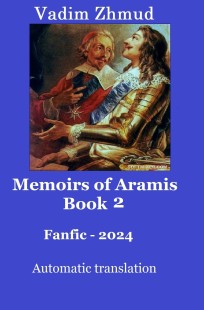
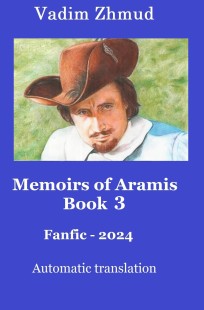
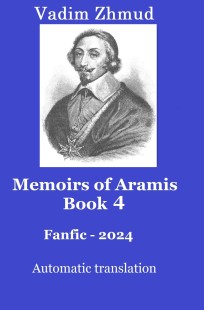

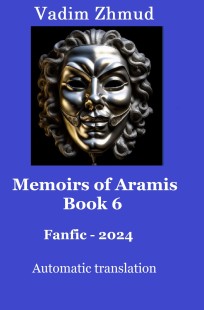

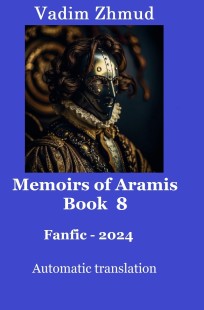







 ЛитСовет
Только что
ЛитСовет
Только что

